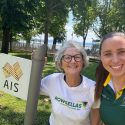
During the transition from infancy into the preschool years, children experience an intensive period of speech and language development. They learn about the world around them through play and their little brains work hard to understand the nuances of communication. This is an exciting time for your child, and also for you as a parent. But have you found yourself in a situation where you have difficulty understanding what your child is saying? Or perhaps you’re getting a short response to ‘What did you do today?’ To understand why this might be happening, let’s first break communication into two parts – speech and language.
Speech
Speech refers to how we produce sounds in words. Some sounds are easier to produce than others, for example ‘m’ and ‘p’ are earlier developing sounds. This is why a child’s first words is often ‘mama’ or ‘papa’. Speech sound development is a gradual process. As children grow older, they acquire more complex speech sounds. The illustration below reflects the most recent research on children’s speech acquisition.
As children learn new sounds, their speech intelligibility also increases. Speech intelligibility refers to the clarity of speech or the portion of verbal output that is understood by an unfamiliar listener. By the age of four, children have acquired almost all speech sounds and should be completely intelligible.
Language
Language refers to how we understand and use words to communicate.
We can further break language into two components.
- Receptive language – understanding what others say
- Expressive language – ability to use words and sentences to express thoughts
Research shows toddlers build their receptive language skills before they begin to use words.
Similar to speech sound acquisition, language development is also a gradual process. Below are the language milestones we expect children to achieve from infancy through to school age.
|
12 months:
|
18 months:
|
24 months:
|
3 years:
|
4 years:
|
5 years:
|
Now, that is a lot to take in.
And a lot that we expect our little ones to ‘just know’.
Coming back to our initial situation, perhaps the reason you have difficulty understanding your child is due to a speech sound delay? Or maybe they don’t have language skills required to firstly understand your question and then respond. Speech Pathologists can support children by forming individualised plans to achieve age appropriate communication milestones.
If you are concerned about your child’s speech and/or language development, contact our Speech Pathology service for an initial consultation. There is strong evidence advising against the ‘wait and see’ approach. The research supporting the long-term benefits of early speech pathology intervention is overwhelming.
Japjot Kaur
Speech Pathologist
B.App.Sc (Speech Pathology), MSPA, CPSP
Sydney West Speech Therapy
We welcome, Japjot Kaur our Speech Pathologist to our team. She is an experienced clinician with special interest in early speech and language intervention. Japjot also provides adult Speech Pathology inpatient services at Westmead Private Hospital and outpatient services at the Westmead rooms.








